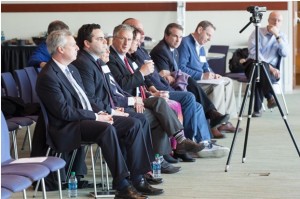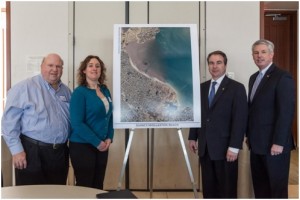This past summer and fall I had the pleasure of working for Save the Harbor/Save the Bay (STH/STB). STH/STB is an environmental education and policy advocacy non-profit located on Boston’s Fish Pier. During my time there, I – along with state legislators, community leaders, and Boston citizens – contributed to the Metropolitan Beaches Commission (MBC) to better Boston beaches.

Part of the Metropolitan Beaches Commission was to facilitate public hearings that happened in each of the 8 beachfront communities that have a state managed beach (Revere, Lynn, Nahant, Winthrop, East Boston, South Boston, Dorchester, Quincy, and Hull) in addition to facilitating two hearings in the Massachusetts State House. My responsibilities for the hearings were numerous, and I learned a lot while working to make the hearings better.
My first responsibility for the hearings was to make calls to community leaders and participants of the last round of hearings (held 6 years ago). During these calls I got to speak to people who cared about beaches and wanted to help and participate in the process, which was rewarding. On the other hand, many times someone would not be able to attend a meeting, but expressed that they wished to attend. The act of calling and talking to hundreds of people (and answering machines) gave me a lot of experience talking to people around the Boston area about the MBC and the issues that ailed the beaches and beachgoers. It also helped me learn the nature of public participation in policy and that is the fact that not everyone has the time or the resources to contribute. This reminded me of readings in Monique’s Environmental Policy class at Bard CEP in which the authors described local interest in political issues. I always wondered why it was so difficult to motivate and mobilize the public, and I realized after my internship that people were just busy. Many people have families and jobs which make it hard to spend the hours it can take to go to a meeting on the other side of town, and once making the commitment to go to a meeting, they were flustered at the fact that the meetings were not always what they expected.

The second responsibility I had was to attend MBC hearings and assist in facilitating them. Aside from the easy parts such as setting up the microphones and tables, we were responsible for helping answer questions, synthesizing the results and findings from meetings, and gathering information from the attendees. I learned a lot about the public process through the 6-7 meetings that I attended for the MBC. One of the first things I learned was the sheer amount of thought and work that went into managing complex resources such as public beaches. This is one thing that was surprising to me and to other attendees after meetings in high maintenance beaches such as Revere or L&M Street Beach. These meetings saw not only attendance from citizens but many community leaders such as the Fire Chief or a representative from the State Police as well as multiple representatives from the Department of Conservation and Recreation. The fact that public employees from multiple government agencies had to coordinate with two to three community groups, recreational centers, and Boston-wide resources in order to manage these beaches impressed me a lot when I was first learning how the beaches worked.
The MBC hearings themselves varied greatly in size and attitude. Some were intimate affairs with 10 commissioners and 10-20 citizens discussing more in-depth development plans or zoning laws, and some had attendance of over 100 people and focused more on the beach-goers immediate experience and beach maintenance issues. The meetings and break down section (halfway through the public hearing, everyone would split into 4 groups to have smaller discussions about what they wanted on the beach) gave me good experience with group dynamics as I learned to balance the opinions within my group and try to organize their thoughts into a more packageable format.
At the end of the hearings I took an informal survey of people’s willingness to accept water pollution and beach closures which led to some great conversations about the history of the beaches and water quality efforts being made all over Boston. The Metropolitan Beaches Commission was a great learning experience and I learned some of the many “dos and don’ts” when it comes to public participation in the policymaking process through my time at Save the Harbor/Save the Bay.
